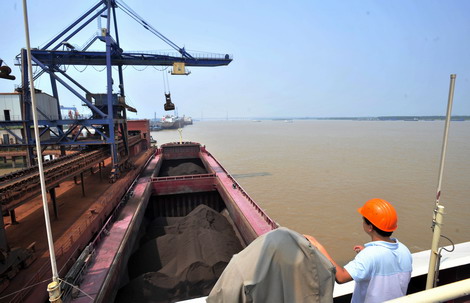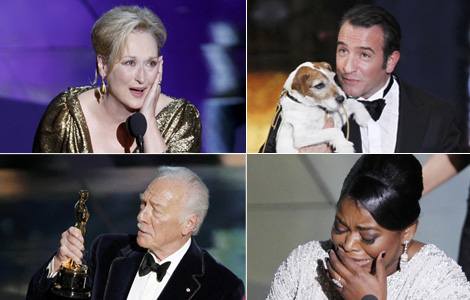Iron ore prices 'to weaken'
Updated: 2012-02-29 09:22
By Du Juan (China Daily)
|
|||||||||||
|
 |
|
Iron concentrate from Brazil arrives at the port of Ningbo city, Zhejiang province. Officials say that as the effects of China's macroeconomic regulations and control measures continue to be felt, it's possible that iron ore prices could fall further. [Photo / China Daily] |
BEIJING - Iron ore prices will trend lower this year with slight fluctuations, and the import price may fall below $110 a ton as the domestic market continues to contract, a senior official said on Tuesday.
"Iron ore prices have entered a declining path. The recent rapid price downturn is a clear signal," Wang Xiaoqi, vice-chairman of the China Iron and Steel Association, told a trade conference.
Since September, the growth in overall steel output has markedly slowed. Growth stopped entirely or even went into reverse in some segments of the market.
The iron ore market has seen extreme volatility since September. Import prices slumped from levels of up to $200 a ton down to $117 a ton, though prices recently rebounded to $135 a ton.
Wang said as the effects of China's macroeconomic policies and control measures continued to be felt, it was possible that iron ore prices would fall further.
However, Chinese companies have continued to increase their rights and interests in overseas iron ore mines. The output from such rights and interests totaled 150 million tons a year as of the end of 2010, according to statistics from the iron and steel association.
That number grew by 30 million tons in 2011. The increase will help China cut dependence on foreign-owned sources, said Wang.
In recent years, domestic iron ore mining capacity grew by 25 percent annually on average.
Mines in development since 2008 will gradually reach their full production capacities, assuming a construction cycle of two to three years.
In 2011, domestic iron ore production increased by 283 million tons, or 27.2 percent.
However, iron ore imports reached 686 million tons in 2011, up 68 percent. The nation's iron ore and steel industry paid an extra $25 billion in foreign exchange because of the rise in the price of imported iron ore.
In a move to gain pricing power for iron ore, a market long dominated by giant global suppliers, and create a transparent pricing system, China launched its first physical iron ore trading platform last month.
The platform was launched by the association in conjunction with the China Beijing International Mining Exchange and the China Chamber of Commerce of Metals Minerals & Chemicals Importers & Exporters.
Wang said the world's top three iron ore producers - Vale SA, BHP Billiton Ltd and Rio Tinto Group - are in talks to join the trading platform.
China's major steel companies - including Baosteel Group Corp, Hebei Iron & Steel Group Co Ltd, Wuhan Iron and Steel Group Corp, Shougang Group, Angang Steel Co and China National Minerals Co Ltd, a subsidiary of China Minerals Corp - have agreed to join the new platform.
Although Chinese demand for iron ore is still increasing, not all of it is effective demand, said Wu Rongqing, chief engineer of the China Mining Association. He said the steel industry still has too much capacity and the level of iron and steel exports are irrationally high.
He estimated that China's raw steel consumption will rise about 4 percent this year to 700 million tons. Gross pig iron ore output will reach 654 million tons, about 26 million tons more than last year.
These figures indicate total demand for iron ore at 1.182 billion tons, he said.
Wu also forecast a global glut of iron ore in 2014.
Related Stories
Iron ore inventories dip in China 2011-12-14 10:20
Rio Tinto achieves record iron ore production 2012-01-17 14:53
Imported iron ore inventories rise as prices gain last week 2012-01-11 11:00
China to increase supply of iron ore 2011-11-08 06:24
- Lifeline thrown to Shanghai's bookstores
- Govt drive aims for fair play on taxis
- High-emission vehicles banned and fined in Beijing
- Business lawsuits in sharp increase in China
- Wealthy residents favor yuan in 2012
- China investment set to increase
- Iron ore prices 'to weaken'
- Overseas money shot in the arm








